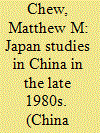| Srl | Item |
| 1 |
ID:
092875


|
|
|
|
|
| Publication |
2009.
|
| Summary/Abstract |
This article adopts a sociology of knowledge perspective to analyze Japan studies scholarship published in China in the late 1980s. The objective of the analysis is to interpret the significant body of scholarship in terms of three of its sociopolitical implications. Firstly, the role of scholarship in its advocacy of Japan as a development model for China will be examined, thereby uncovering one of the multiple historical sources for the Chinese reform. Secondly, Japanese studies scholars, despite their being establishment intellectuals, made bold proposals in the late 1980s for economic, political, and social change. Thirdly, this article will document the Japan studies scholars' largely positive appraisal of Japan as well as their resistance of anti-Japanese sentiments in the Chinese state and society. Findings indicate that the scholarship deviated from the official line, critiqued the Chinese state, promoted radical reform proposals, positively evaluated Japan, and offered a Japanese model for China's reform.
|
|
|
|
|
|
|
|
|
|
|
|
|
|
|
|
| 2 |
ID:
170187


|
|
|
|
|
| Summary/Abstract |
In the two decades after 1995, the Chinese Communist Party (CCP) executed a significant philosophical shift in its relentless struggle for legitimacy and relevance through the Sinicization of Marxism (马克思主义中国化). Following the pattern of many other political reorientations, the party undertook a reassessment of a prominent historical figure to conduct ideological work – in this case, a leading May Fourth intellectual, Hu Shi. For decades the orthodox CCP view of Hu had been uniformly negative, but from 1995 onwards the People’s Republic of China’s establishment intellectuals presented a more positive appraisal of his impact on Chinese history. Previous scholarship on the rehabilitation of Hu argues that the shift reflected the more liberal academic and political climate of the times. This article argues however that the reappraisal of Hu enabled the CCP to manage a key problem in its political identity – the disjuncture between revolutionary Maoism and reform-era policies captured by the slogan ‘socialism with Chinese characteristics’. By analysing the discussion on a key 1919 debate – known as the ‘problems and isms’ debate – I show that the CCP used Hu’s philosophical ruminations to trace the Sinicization of Marxism from the moment Marxism entered China to reform-era socialism with Chinese characteristics, and in the process it diminished the role of revolutionary Maoism. In so doing, the CCP consolidated legitimacy through showing its leading role in the historic Sinicization of Marxism without Maoism.
|
|
|
|
|
|
|
|
|
|
|
|
|
|
|
|